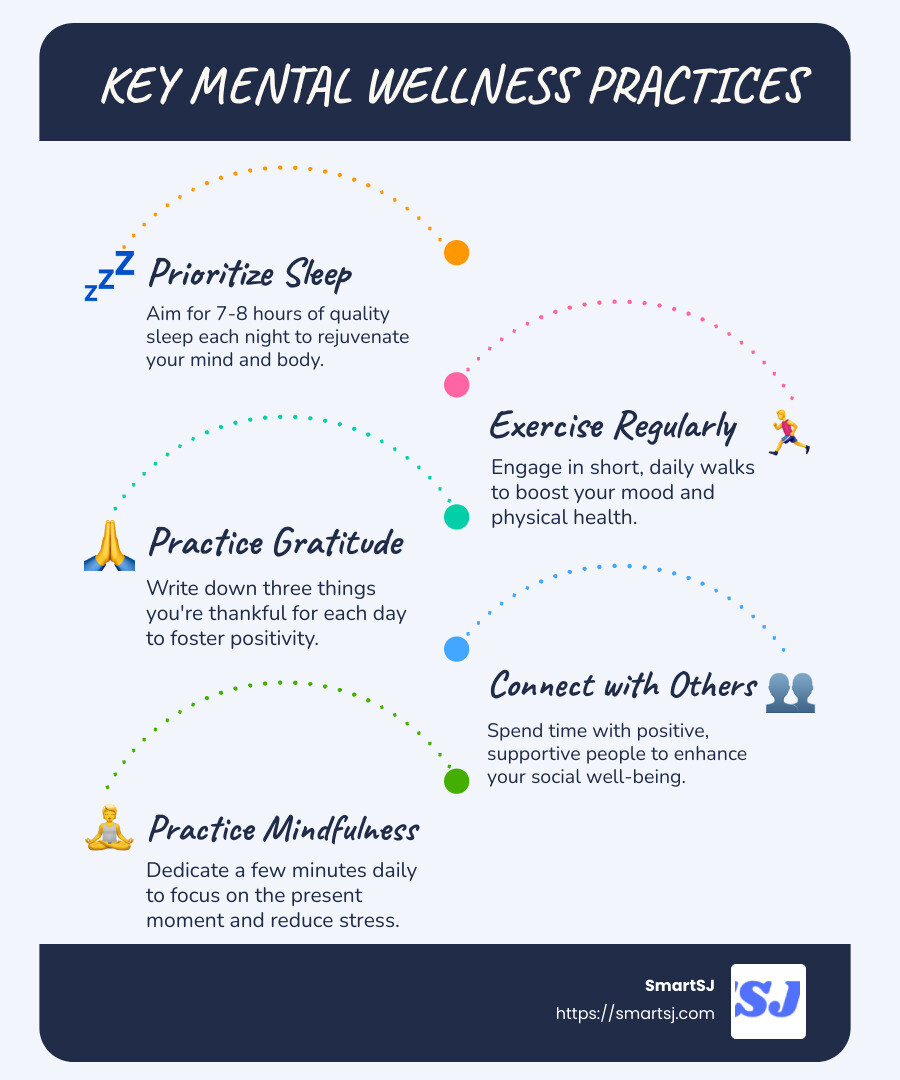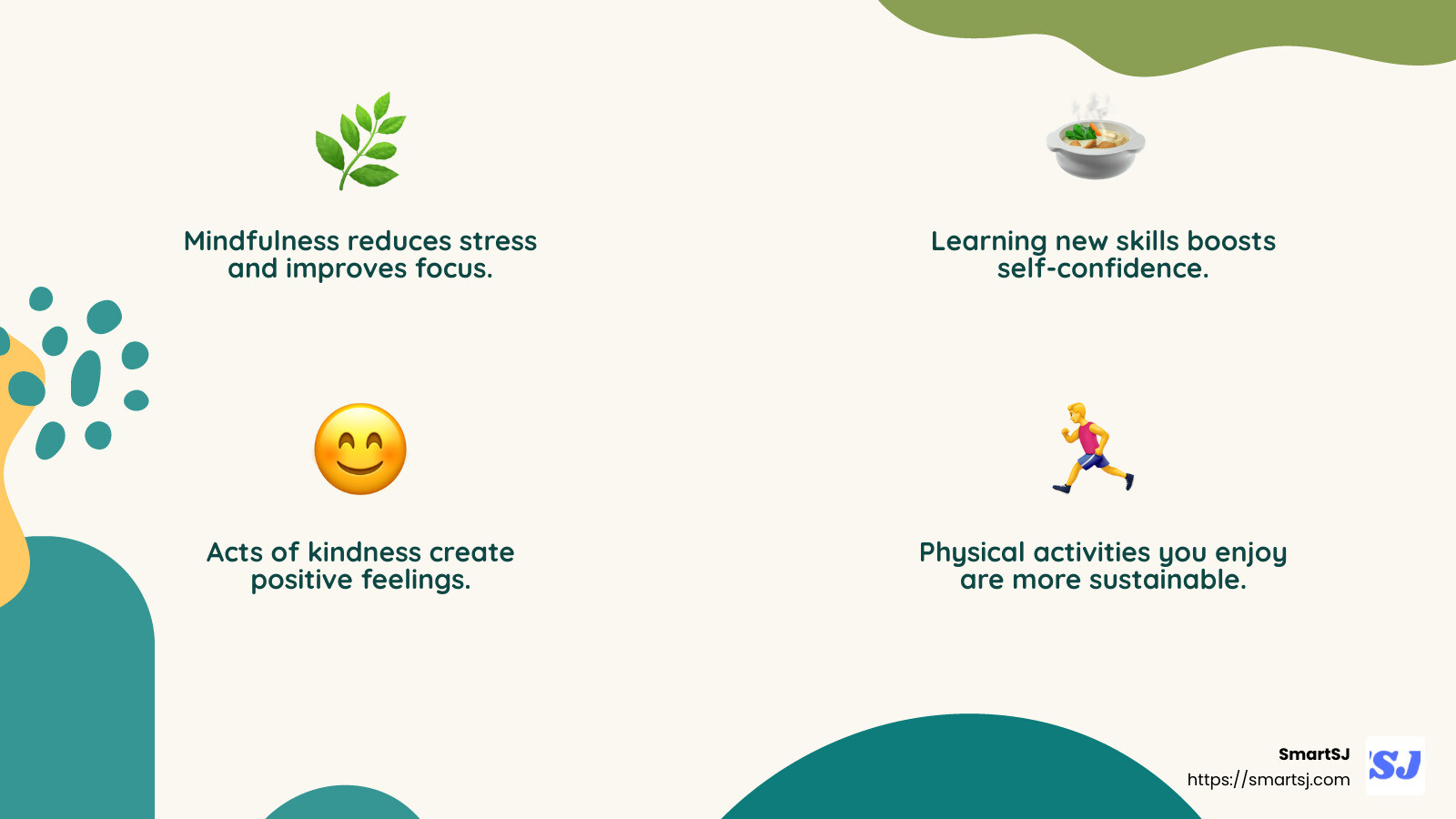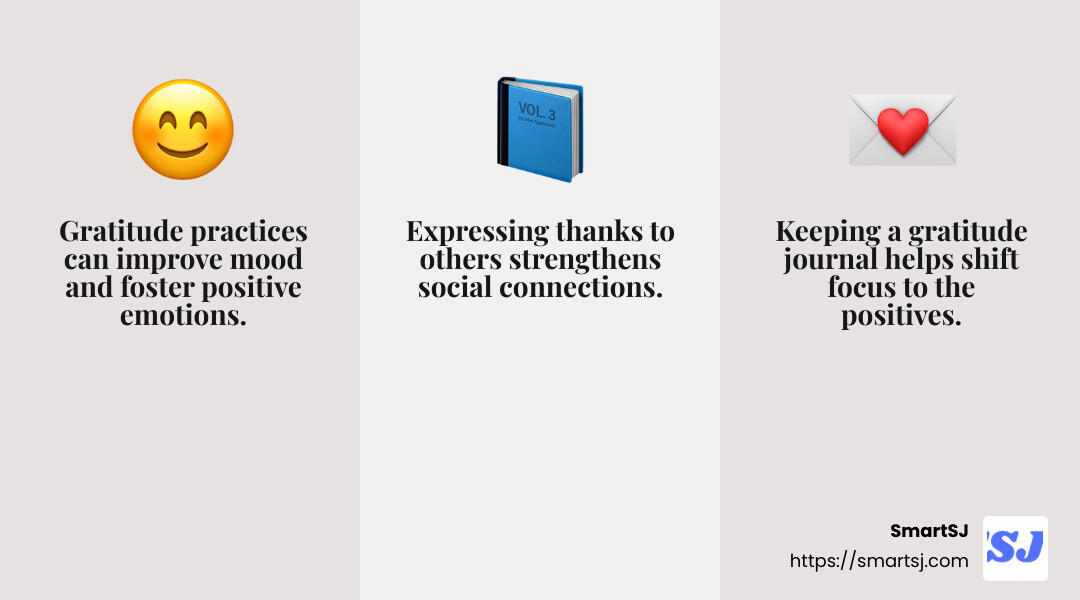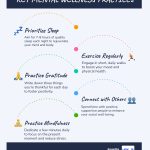
Mental wellness practices are essential for maintaining a healthy mind and body. They help you manage stress, boost focus, and improve overall well-being. If you’re looking for quick tips, consider these:
- Prioritize sleep: Aim for 7-8 hours of quality sleep each night.
- Exercise regularly: Even short, daily walks can make a big difference.
- Practice gratitude: Write down three things you’re thankful for each day.
- Connect with others: Spend time with positive, supportive people.
- Practice mindfulness: Dedicate a few minutes daily to focus on the present moment.
In today’s world, mental health and emotional wellness are not just buzzwords; they’re critical components of a balanced life. Maintaining your mental well-being can seem daunting, especially with the complexities of modern life challenging our mental resilience. Yet, small, consistent actions can lead to big improvements.
At SmartSJ, we’re passionate about helping you open up the power of your mind. Our mission is to guide you towards cognitive excellence by providing science-backed insights and practical techniques for mental wellness practices. With our expertise and resources, we’re here to help you improve your mental strength and open up your full potential.
5 Steps to Mental Wellbeing
In the quest for a balanced life, following these 5 steps to mental wellbeing can make a world of difference. These steps are not just about feeling good; they’re about flourishing.
1. Connect with Others
Building strong relationships is crucial for mental health. Good connections with family and friends provide emotional support, a sense of belonging, and opportunities to share positive experiences.
- Have regular family dinners. It’s a simple way to connect daily.
- Plan outings with friends you haven’t seen in a while.
- Use video calls to stay in touch with loved ones far away.
Remember: Don’t rely solely on social media. Face-to-face interactions are key.
2. Be Physically Active
Physical activity is a powerful mood booster. It raises self-esteem, helps you set and achieve goals, and releases chemicals in the brain that improve mood.
- Start with simple activities like walking or jogging.
- Explore strength exercises to build muscle and improve balance.
- Find activities you love, so they become a regular part of your life.
Tip: You don’t need a gym membership. Activities you enjoy are more sustainable.
3. Learn New Skills
Learning is not just for school. It boosts self-confidence, builds a sense of purpose, and helps you connect with others.
- Try cooking a new recipe or starting a DIY project.
- Take on new responsibilities at work to challenge yourself.
- Consider learning a new language or hobby.
Focus on enjoyment, not qualifications. The goal is to learn and grow.
4. Give to Others
Acts of kindness and giving can create positive feelings and a sense of reward. They also help you connect with others and build a sense of self-worth.
- Volunteer at local community groups or schools.
- Offer help to a friend or family member in need.
- Small acts of kindness, like a smile or a compliment, go a long way.
Remember: Giving isn’t just about money; your time and effort are valuable too.
5. Practice Mindfulness
Mindfulness is about paying attention to the present moment. It helps reduce stress and improve focus.
- Try deep breathing exercises or meditation.
- Enjoy a walk while noticing your surroundings.
- Practice mindful eating by savoring each bite.
Mindfulness can be as simple as taking a moment to breathe deeply.

By integrating these steps into your daily routine, you can significantly improve your mental wellbeing. Each step offers unique benefits and contributes to a more resilient, fulfilling life.
Science-Backed Mental Wellness Practices
In today’s world, maintaining mental wellness can feel challenging. However, incorporating science-backed mental wellness practices into your daily routine can make a significant difference. Let’s explore five key practices: self-care, gratitude, mindfulness, social connections, and sleep quality.
Self-Care
Self-care is about taking steps to preserve or improve your health. It involves simple activities that ensure your physical and mental well-being.
- Exercise: Engage in activities like yoga or jogging, which can reduce stress and boost mood.
- Nutrition: Eat a balanced diet rich in omega-3s and antioxidants to support brain health.
- Mini-Breaks: Take short breaks throughout the day to recharge and reduce stress levels.
Remember: Self-care is not a luxury; it’s a necessity for maintaining mental health.
Gratitude
Practicing gratitude shifts your focus from what’s wrong to what’s right in your life. This simple act can improve your mood and overall well-being.
- Gratitude Journal: Write down three things you’re thankful for each day.
- Thank You Notes: Express appreciation to friends and family, strengthening your connections.

Tip: Regular gratitude exercises can lead to lasting positive changes in your mindset.
Mindfulness
Mindfulness is the practice of being present in the moment. It helps reduce stress and improves focus.
- Deep Breathing: Inhale through your nose for a count of four, hold, and exhale through your mouth for five.
- Mindful Eating: Focus on the taste and texture of your food, enjoying each bite.
- Body Scan: Close your eyes and mentally scan your body from head to toe, noticing any sensations.
Mindfulness is not just a practice; it’s a way to live more fully in the present.
Social Connections
Strong social connections are vital for emotional and physical health. They provide support, reduce stress, and increase happiness.
- Family Dinners: Share meals with family to strengthen bonds.
- Join Groups: Participate in clubs or community activities that interest you.
- Volunteer: Help others, which can also boost your own mood and sense of purpose.
Fact: People with strong social connections tend to live longer and healthier lives.
Sleep Quality
Quality sleep is crucial for mental health. It helps consolidate memories and clear out toxins from your brain.
- Consistent Schedule: Go to bed and wake up at the same time every day.
- Sleep Environment: Create a restful space with minimal noise and comfortable bedding.
- Limit Screen Time: Reduce exposure to screens at least an hour before bed.
Reminder: Adults need 7–9 hours of sleep each night for optimal mental function.
By incorporating these science-backed practices into your life, you can improve your mental wellness and resilience. These strategies are simple yet powerful tools for maintaining a healthy mind and body.
Strategies for Improving Mental Health at Work
Workplace mental health is crucial in today’s busy work environment. Many people spend a large part of their day at work, so it’s important to have strategies that maintain mental wellness. Here are some expert-backed practices to help you thrive at work:
Self-Care
Taking care of yourself is vital, even at work. Simple self-care practices can make a huge difference in your overall wellness.
- Mini-Breaks: Take short breaks throughout the day. Even five minutes to step away from your desk and breathe deeply can help reduce stress.
- Healthy Snacks: Keep nutritious snacks like fruits or nuts at your desk to maintain energy levels and support brain health.
Remember: Self-care is not just for home; it’s essential at work too.
Communication
Good communication can ease workplace stress and improve relationships with colleagues.
- Open Dialogue: Encourage open conversations about workload and stress levels. This fosters a supportive work environment.
- Feedback: Regularly give and receive constructive feedback. It helps improve performance and reduces misunderstandings.
Tip: Clear communication is key to a harmonious work environment.
Stress Management
Managing stress effectively can prevent burnout and keep you feeling positive and productive.
- Mindfulness Breaks: Use apps like Headspace or Calm for quick mindfulness exercises during breaks.
- Set Boundaries: Clearly define work hours to separate work from personal time, which helps prevent burnout.
Fact: Mindfulness practices can significantly reduce stress and improve focus.
Social Connections
Building strong relationships at work can improve your mental well-being.
- Team Lunches: Regularly schedule team lunches to strengthen bonds and improve morale.
- Peer Support: Create a buddy system where colleagues can support each other during stressful times.
Fact: Employees with strong social ties at work report higher job satisfaction.
By implementing these strategies, you can improve your mental health at work and create a more balanced and fulfilling work life. These practices not only benefit individuals but also contribute to a healthier workplace culture.
31 Tips to Boost Your Mental Health
Boosting your mental health doesn’t have to be complicated. Here are some simple yet effective mental wellness practices to incorporate into your daily life:
Gratitude Journal
Keeping a gratitude journal is a powerful tool for enhancing mental well-being. Every day, write down three things you’re grateful for and three things you accomplished. This practice helps shift your focus to the positive aspects of life, which can improve overall happiness.
“Gratitude turns what we have into enough.” – Unknown
Creative Expression
Engaging in creative activities can significantly boost your mood and reduce stress. Whether it’s painting, writing a poem, or trying out a new recipe, creative expression allows you to explore your thoughts and emotions in a healthy way.
- Try This: Set aside time each week to engage in a creative hobby you enjoy.
Socializing
Strong social connections are vital for good mental health. Spend time with friends and family, and don’t hesitate to reach out when you need support. Building and maintaining these relationships can provide a sense of belonging and reduce feelings of loneliness.
- Tip: Schedule regular meet-ups with loved ones, even if it’s just a quick coffee catch-up.
Nature Walks
Spending time in nature can have a calming effect on the mind. Nature walks not only provide physical exercise but also help clear your mind, reduce stress, and improve mood.
- Fact: Studies show that being in nature can lower levels of cortisol, the stress hormone.
Mindfulness
Practicing mindfulness helps you stay present in the moment, reducing anxiety and improving focus. Simple mindfulness exercises, like deep breathing or mindful eating, can be integrated into your daily routine.
- Try This: Dedicate a few minutes each day to mindfulness activities, such as meditation or mindful walking.
By incorporating these tips into your daily life, you can improve your mental health and build resilience against stress. These practices are not just about managing mental health challenges but also about thriving and finding joy in everyday moments.
Frequently Asked Questions about Mental Wellness Practices
What are the five ways to mental wellbeing?
The five ways to mental wellbeing are simple actions you can take to improve your mental health. They include:
- Connect with Others: Social connections are crucial for mental wellness. Spend time with family and friends, join a club, or volunteer in your community.
- Be Physically Active: Exercise releases endorphins, which can boost your mood. Whether it’s a walk in the park or a dance class, find an activity you enjoy.
- Learn New Skills: Challenging yourself with new skills can boost self-confidence. Try cooking a new recipe, learning a language, or taking up a new hobby.
- Give to Others: Acts of kindness, like helping a neighbor or volunteering, can create positive feelings and a sense of reward.
- Mindfulness: Being mindful means paying attention to the present moment. Practice mindfulness through meditation, deep breathing, or simply observing your surroundings.
What are good mental health practices?
Good mental health practices are habits that support emotional and psychological well-being. These include:
- Self-Care: Take time for activities that nurture your body and mind, like reading, taking a bath, or enjoying a hobby.
- Gratitude: Keep a gratitude journal to focus on positive aspects of your life.
- Sleep Quality: Ensure you get enough restful sleep each night to recharge your mind and body.
- Social Connections: Maintain strong relationships with family and friends for support and companionship.
- Stress Management: Use techniques like yoga, meditation, or breathing exercises to manage stress effectively.
What are the 5 C’s of mental health?
The 5 C’s of mental health are key components that contribute to mental wellness:
- Connection: Building strong relationships with others.
- Coping: Developing strategies to handle stress and challenges.
- Control: Having a sense of control over your life and decisions.
- Competence: Feeling capable and effective in your activities.
- Confidence: Believing in your abilities and self-worth.
By understanding and implementing these principles, you can improve your mental wellness and steer life’s challenges with resilience.
Conclusion
At SmartSJ, we believe in the power of mental strength strategies to transform lives. Our mission is to provide you with science-backed techniques and resources that help open up your mental potential and improve cognitive performance.
Mental wellness practices are at the heart of what we do. By incorporating self-care, gratitude, mindfulness, and social connections into your daily routine, you can improve your emotional and psychological well-being. These practices are not just about feeling good; they are essential for building resilience and adapting to life’s challenges.
Improving cognitive performance starts with taking care of your brain. Ensuring quality sleep, staying physically active, and engaging in activities that stimulate your mind are all steps towards a healthier, smarter brain. By consistently applying these practices, you can boost your focus, memory, and creativity.
We encourage you to explore our resources and articles on mental strength to find more about how you can improve your mental wellness. It’s the small, intentional actions you take every day that lead to meaningful improvements over time.
Thank you for joining us on this journey towards a resilient and well-balanced life. Your smarter, stronger brain is waiting for you to open up its full potential.









